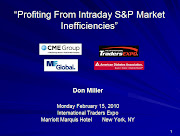 Well, I don't normally do three posts in one day, yet I felt that given the ever-increasing exposure this blog is getting, I might as well use it to help all of us further circulate the attached links discussing the proposed financial transaction tax that Luke referenced in today's comments, as well as the excellent response and assessment by Robert Green of the trader tax specialist Green & Company firm.
Well, I don't normally do three posts in one day, yet I felt that given the ever-increasing exposure this blog is getting, I might as well use it to help all of us further circulate the attached links discussing the proposed financial transaction tax that Luke referenced in today's comments, as well as the excellent response and assessment by Robert Green of the trader tax specialist Green & Company firm.1/12/09 NY Times Article
Full Paper from the Center of Economic and Policy Research
Green & Company Response
Please note I don't want to fill the blog with a national debate on this -- let's keep focused on trading -- yet the effort is certainly something we all should be aware of.
Seems it may be time for all in the trading industry to unite once again.
















11 comments:
Don,
Since the futures had an extreme sell off at the end of trading on friday I would assume that one of your strategies tommorow on open would be to wait for a pullback or retracement up to around the 815- 820 area and then short from that area. I remember you saying in your friday comments "I typically fade the first move on the day after a strong trend -- preferably with the trend on a pullback" where you decided to go long and got frustrated after a head fake where you circled the spot on the graph, because the previous day we had an extreme rally into the close whether it was due to short covering or the expected announcement of a plan to halt forclosures. I am just asking your opinion because it seems we are having the exact inverse set-up to the graph you posted on friday. When you say u typically fade the first move the day after a strong trend are you referring to a closing strong trend or the overall daily trend for the day? Thanx Don
GIGO -
Strong closing trend.
I usually take Monday mornings pretty slow though given the weekend break (and this case Tuesday given the Holiday), and am more apt to simply let the day develop and try to jump in to match its rhythm at some point.
Yet any other day of the week, I'd be looking just as you said, and still will consider it as tomorrow opens
Don
Following up on an earlier post comparing trading to digging for gold. I used to own one of those businesses where people would consantly tell you, "you have a gold mine on your hands."
My response would be, "do you have any idea the length of toil and degree of backbreaking work it takes to dig for and extract the gold?"
I have found that true in most pursuits, including trading, where the end result appears to yield many times greater than the present visible effort being put forth. Once you find the vein, the riches appear to flow freely to the casual observer, getting throught through several hundred feet of bedrock with a pick and shovel is the real bitch.
Hello Don,
I had a look at your daily scorecard and it looks great. However I wonder if it could be improved by including time zones in it? This way you could learn which times of the day you are trading best.
Just an idea. Keep up the great work!
Greetings from Belgium,
Peter
Hi Peter -
I pretty much know when I stink having done this for a decade (after 3:30pm) which is why I have the late PM discipline score.
Other than that, time of day should be irrelvant for me and I should trade when the opportunity is ripe, regardless of time -- assuming I don't have a non-market conflict which I sometimes do.
Don
Don,
Thanks for the info on the traders tax. Of course I had no idea there ever was such an insane idea already proposed, and rejected (so far), while I traded in blissful ignorance. I am passing this info around to others now. I won't try to turn this into a rant about $%@&*#@!! politicians so feel free to not publish this if you like.
Chuck -
No problem with the $%@&*#@!!
I can't believe it could ever pass in its current form, as liquidity would likely die as Luke mentioned.
Don
Politicians only care about their perceived image to the masses & I believe they are willing to sacrifice any industry if they feel if will perpetuate their lust for power.
Example: John Conyers' post-China/Mattel ban on lead in any product sold to kids 12 and under has decimated the powersports industry. Dealers have been forced to pull all youth models off the showroom floor (20% on average, 50% in California)as lead is used in steel alloys. Many dealers have already closed shop. Resale stores are collapsing in droves, unable to comply with this new law.
If they are willing to destroy hundreds, maybe thousands of small businesses who have no bad press whatsoever, then why not traders who have been vilified by the media at Washington's prodding. First blaming speculators for high gas prices, then demonizing us for having the audacity to make a profit during the financial meltdown, the peasants with pitchforks will be delighted to see the evil rich traders go down in flames.
And don't even get me started on the brilliance of capping executive salaries from sea to shining sea... I can hear Hugo Chavez clapping giddily all the way from Venezuela.
Hello Don,
"Other than that, time of day should be irrelvant for me and I should trade when the opportunity is ripe, regardless of time".
Currently I'm studying the relationship between different intraday timezones and market behaviour.
Marshall Jones divided the intraday market in 14 timezones for futures trading:
1. The open… 9:30 – 9:50 EST a red zone.
2. Ten o’clock reverse… 9:50 – 10:10 EST a yellow zone.
3. Now’s the time… 10:10 – 10:25 EST a green zone.
4. It’s about time… 10:25 – 10:30 EST a yellow zone
5. Time and time again… 10:30 – 11:15 EST a green zone.
6. Time out… 11:15 – 2:15 EST a red zone.
7. Time on my hands… 1:25 – 1:35 EST a yellow zone.
8. Times flying by… 2:15 – 3:00 EST a green zone.
9. Time to catch the train… 3:00 – 3:10 EST a yellow zone.
10. Time, and time again … 3:10 – 3:25 EST a green zone.
11. Take your time… 3:25 – 3:30 EST a yellow zone.
12. Times running out… 3:30 – 3:40 EST a green zone.
13. Time to settle down… 3:40 – 3:45 EST a yellow zone.
14. Where did the time go… 3:45 – 4:00 EST a green zone.
- The red zone is the most dangerous time period for most, except the experienced day-trader. It means to be extra careful.
- The yellow zone is time for the market to stall, pullback, or reverse.
- The green zone does not mean up or down; just one of the safest time frames to trade.
Now I wonder what you think of this? If i read the different timezones i conclude that it is a good idea to set my mental stop loss (number of ticks) dependent on the time zone.
However it seems you don't set different stop losses for trades in different intraday time zones. Can I ask you what makes you set your stop loss small or wide?
Peter
Peter -
I rarely use stop losses as I manage risk primarily with size and since I usually begin entering partial positions at wholseale entry points which gives me a head start.
It depends on the setup I suppose, but certainly if the reason I began getting in the trade turns out to be invalid, I'll work on trying to deftly exit without panicking out with the retail crowd.
Easier said than done of course :-).
Don
Hello Don and all traders,
The potential financial transaction tax was re-introduced in the house last Friday February 13th by U.S. Congressman Peter DeFazio. The bill proposed is H.R. 1068: “Let Wall Street Pay for Wall Street's Bailout Act of 2009”. It would inpose a .25% tax on every stock, option and future transaction (.50% roundtrip). Please understand this is not a tax on profit, it's a tax on the total amount of your trade whether it's profitable or not.
The link for the aforementioned bill is here:
http://thomas.loc.gov/cgi-bin/query/z?c111:H.R.1068.IH:
Not only is this proposed tax mentioned in the above bill, it is also is listed as a line item in "The National Health Care Act" (HR 676 Section 211, Sub-Section C - "Funding".)
The link to that bill is here:
http://www.govtrack.us/congress/billtext.xpd?bill=h111-676&version=ih&nid=t0%3Aih%3A173
There is a petition at the link below that you can "sign" showing your opposition to this tax:
http://www.rallycongress.com/no2tradertax/1536/tell-congres-to-block-trader-tax/
I also urge you to contact your own U.S. Representative and let them know how this tax would negatively affect you.
Thanks for your help,
Ric
Post a Comment